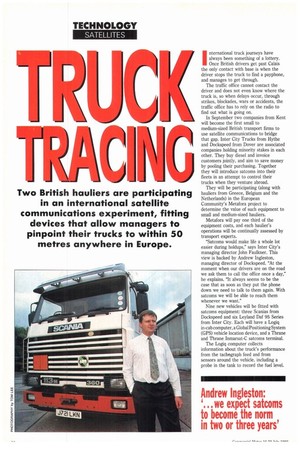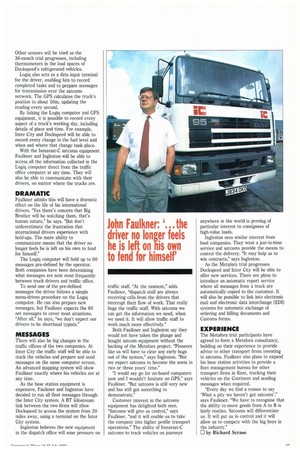Two British hauliers are participating in an international satellite communications
Page 38

Page 39

If you've noticed an error in this article please click here to report it so we can fix it.
experiment, fitting devices that allow managers to pinpoint their trucks to within 50 metres anywhere in Europe.
International truck journeys have always been something of a lottery. Once British drivers get past Calais the only contact with base is when the driver stops the truck to find a payphone, and manages to get through.
The traffic office cannot contact the driver and does not even know where the truck is, so when delays occur, through strikes, blockades, wars or accidents, the traffic office has to rely on the radio to find out what is going on.
In September two companies from Kent will become the first small to medium-sized British transport firms to use satellite communications to bridge that gap. Inter City Trucks from Hythe and Dockspeed from Dover are associated companies holding minority stakes in each other. They buy diesel and invoice customers jointly, and aim to save money by pooling their purchasing. Together they will introduce satcoms into their fleets in an attempt to control their trucks when they venture abroad.
They will be participating (along with hauliers from Greece, Belgium and the Netherlands) in the European Community's Metafora project to determine the value of such equipment to small and medium-sized hauliers.
Metafora will pay one third of the equipment costs, and each haulier's operations will be continually assessed by transport experts.
"Satcoms would make life a whole lot easier during holdups," says Inter City's managing director John Faulkner. This view is backed by Andrew Ingleston, managing director of Dockspeed. "At the moment when our drivers are on the road we ask them to call the office once a day," he explains. It always seems to be the case that as soon as they put the phone down we need to talk to them again. With satcoms we will be able to reach them whenever we want."
Nine new vehicles will be fitted with satcoms equipment: three Scanias from Dockspeed and six Leyland Daf 95 Series from Inter City. Each will have a Logiq in-cab computer, a Global Positioning System (GPS) vehicle location device, and a Thrane and Thrane Inmarsat-C satcoms terminal.
The Logiq computer collects information about the truck's performance from the tachograph feed and from sensors around the vehicle, including a probe in the tank to record the fuel level. Other sensors will be tried as the 36-month trial progresses, including thermometers in the load spaces of Dockspeed's refrigerated vehicles, Logiq also acts as a data input terminal for the driver, enabling him to record completed tasks and to prepare messages for transmission over the satcoms network. The GPS calculates the truck's position to about 50m, updating the reading every second.
By linking the Logiq computer and GPS equipment, it is possible to record every aspect of a truck's working day, including details of place and time. For example, Inter City and Dockspeed will be able to• record every change in the fuel level and when and where that change took place.
With the Inmarsat-C satcoms equipment Faulkner and Ingleston will be able to access all the information collected in the Logiq computer direct from the traffic office computer at any time. They will also be able to communicate with their drivers, no matter where the trucks are.
DRAMATIC
Faulkner admits this will have a dramatic effect on the life of his international drivers. "Yes there's concern that Big Brother will be watching them, that's human nature," he says. "But don't underestimate the frustration that international drivers experience with hold-ups. The mere ability to communicate means that the driver no longer feels he is left on his own to fend for himself."
The Logiq computer will hold up to 60 messages pre-defined by the operator. Both companies have been determining what messages are sent most frequently between truck drivers and traffic office.
To send one of the pre-defined messages the driver follows a simple menu-driven procedure on the Logiq computer, He can also prepare new messages, but Faulkner expects the 60 set messages to cover most situations. "After all," he says, "we don't expect our drivers to be shorthand typists."
MESSAGES
There will also be big changes in the traffic offices of the two companies. At Inter City the traffic staff will be able to track the vehicles and prepare and send messages on the same computer screen. An advanced mapping system will show Faulkner exactly where his vehicles are at any time.
As the base station equipment is expensive, Faulkner and Ingleston have decided to run all fleet messages through the Inter City system, A BT kilostream link between the two firms will allow Dockspeed to access the system from 20 miles away, using a terminal on the Inter City system.
Ingleston believes the new equipment in the dispatch office will ease pressure on traffic staff. "At the moment," adds Faulkner, "dispatch staff are always receiving calls from the drivers that interrupt their flow of work. That really bugs the traffic staff. With satcoms we can get the information we need, when we need it. It will allow traffic staff to work much more effectively."
Both Faulkner and Ingleston say they would not have taken the plunge and bought satcom equipment without the backing of the Metafora project. 'Pioneers like us will have to clear any early bugs out of the system," says Ingleston. "But we expect satcoms to become the norm in two or three years' time."
"I would say go for on-board computers now and I wouldn't hesitate on GPS," says Faulkner. "But satcoms is still very new and has still got something to demonstrate."
Customer interest in the satcoms equipment has delighted both men. "Satcoms will give us control," says Faulkner, "and it will enable us to take the company into higher profile transport operations." The ability of Inmarsat-C satcoms to track vehicles on journeys anywhere in the world is proving of particular interest to consignees of high-value loads.
Ingleston sees similar interest from food companies. They want a just-in-time service and satcoms provide the means to control the delivery. It may help us to win contracts," says Ingleston.
As the Metafora trial progresses Dockspeed and Inter City will be able to offer new services. There are plans to introduce an automatic report service where all messages from a truck are automatically copied to the customer. It will also be possible to link into electronic mail and electronic data interchange (EDI) systems for automatic exchange of ordering and billing documents and Customs forms.
EXPERIENCE
The Metafora trial participants have agreed to form a Metafora consultancy, building on their experience to provide advice to other transport firms investing in satcoms. Faulkner also plans to expand his base station activities to provide a fleet management bureau for other transport firms in Kent, tracking their vehicles on the Continent and sending messages when required.
"Every day we find a reason to say 'What a pity we haven't got satcoms'," says Faulkner. "We have to recognise that the ability to move goods from A to B is fairly routine. Satconris will differentiate us. It will put us in control and it will allow us to compete with the big boys in the industry."
El by Richard Scrase
















































































